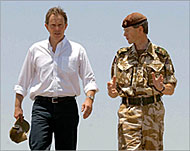BBC, UK gov’t showdown continues
The UK government is locked in an increasingly bitter dispute on Sunday with the British Broadcasting Corporation (BBC) over its reports that Prime Minister Tony Blair’s office embellished intelligence findings to justify London’s war against Iraq.

Allies of Alastair Campbell, the government’s Director of Communications and a key Blair aide, exerted pressure on the public broadcaster to apologise, accusing it of “unethical journalism” and lies.
BBC journalist turned-government minister Ben Bradshaw claimed the BBC broke its own guidelines in the way it handled its story.
“There are quite clear BBC guidelines that you should not rely on a single anonymous source,” said Bradshaw.
The row is over a BBC report in late May in which an unidentified source said that Blair’s inner circle last year over-exaggerated a September dossier which claimed Iraq possessed weapons of mass destruction (WMD), to justify a case for war on Baghdad.
Since the war was launched on 20 March, occupation troops have not found nuclear, biological and chemical arms in Iraq.
The United States is also under intense pressure to provide proof that Iraq possessed such arms, after Washington used Baghdad’s alleged arms programme as an excuse to launch war against the oil-rich nation.
Row intensifies
 |
|
British troops in Iraq have come |
When a presenter for BBC radio’s Today Programme on Saturday told Bradshaw that the Defence Ministry had been informed of the report the day before it was broadcast, Bradshaw again lashed out.
“This is just another example of the BBC desperately trying to defend the indefensible, namely poor and unethical journalism,” said Bradshaw.
Defence Secretary Geoff Hoon stepped up the row, saying in a statement, “I strongly support the request to the BBC to correct this morning’s misleading comments. They are simply not true.”
BBC news director Richard Sambrook defended the corporation’s reports.
“In terms of Ben Bradshaw today, again, he has misrepresented our journalism and the way we conducted it,” said Sambrook.
The UK government report claimed Iraq was able to deploy chemical or biological weapons within 45 minutes of an order to do so.
BBC radio’s Today Programme in May quoted as unidentified source a suggestion that the line was inserted under pressure from the Prime Minister’s office.
On Saturday Today, correspondent Andrew Gilligan who originally reported the story about the September dossier, threatened legal action.
He accused Phil Woolas, Deputy House of Commons leader for the ruling Labour party, of trying to taint remarks he made last week.